Recycling at School
Learn the benefits and best practices for recycling at school and in the classroom.
There are ways to improve your school's health and to decrease the impact on the environment. A healthier school is a better learning environment. Plus, greening your school may lower its operating costs.
For details about starting a recycling program at your school, contact our education specialist at (216) 443-3731 or send an email.
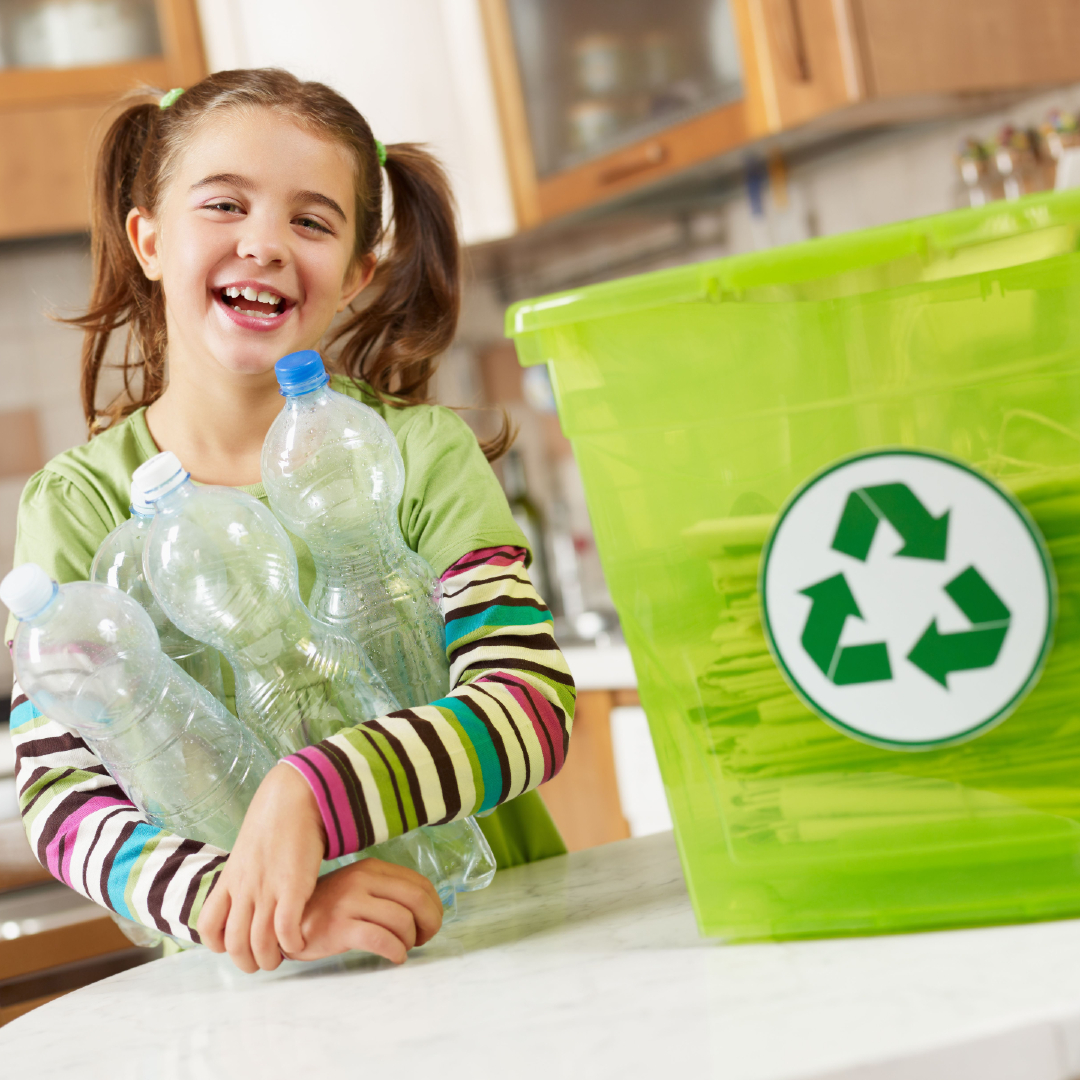
Start Recycling!
- Paper can easily be collected in about every room of the building. Paper products make up around 90% of what a school throws in its dumpster.
- Place recycling bins in the cafeteria and around the school to collect empty cans, cartons and plastic bottles. Make sure to include a sink or bucket in the cafeteria for students to dump out any remaining liquid before recycling.
- Don't throw your old electronics away. Computers, printers, toner cartridges and other electronics equipment can be easily recycled without much effort.
- Collect and recycle automotive fluids at your vocational school.
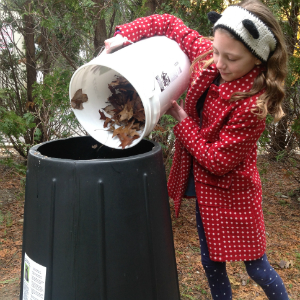
Add waste reduction activities
- Serve cafeteria food on sectioned trays that can be washed and reused.
- Optimize food planning to reduce leftovers. Donate leftovers to a local food bank or hunger center.
- Compost organic leftover from lunches and cafeteria waste. Compost bins are available for purchase from the Solid Waste District.
- Encourage students who pack a lunch or snacks to use a reusable bag, reusable containers, utensils and a cloth napkin.
- Send all flyers, announcements, newsletters and notes home electronically. Reduce the number of paper copies that you make.
- Include automatic paper towel dispenser in bathrooms.
- Donate extra or unwanted classroom and art supplies to an organization in need. See a list of local options.
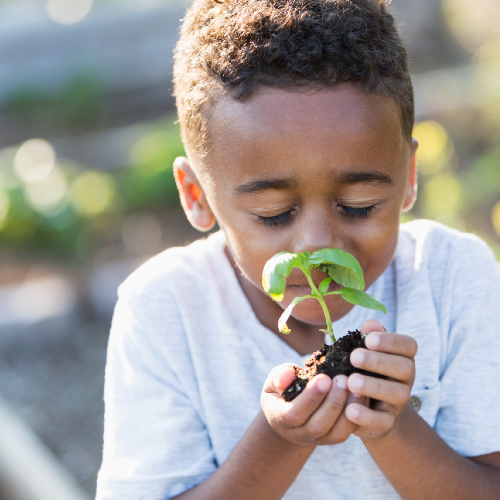
Reduce toxins
- Evaluate the need for hazardous chemicals in the school.
- Remove sources of mercury. Use alcohol thermometers instead of mercury ones.
- Institute an integrated pest management system and eliminate the use of toxic pesticides.
- Replace hazardous cleaning products with non-toxic, natural or biodegradable cleaners.

Decrease energy consumption
- Create greater flexibility for indoor climate control by placing thermostats in classrooms or in regions of the building so teachers can adjust the climate. Set thermostats to automatically lower temperatures during non-operating hours.
- Install equipment that would decrease the need for lights. Include daylighting features and motion light sensors.
- Install vegetation that creates windbreaks for the buildings as well as provide shade during warmer months.
- Have students monitor the school's energy and water usage as a class project.
- Install equipment that will decrease water usage. Fix leaky faucets.
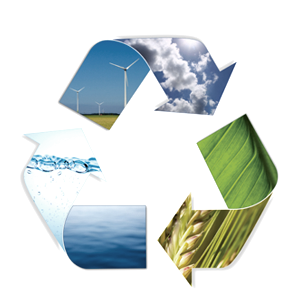
Buy green products
- Revise procurement specifications to give preference to green products.
- Purchase recycled content materials. Choose paper products with the highest percentage of post-consumer waste.
Other tips
- Include proper ventilation systems for indoor air.
- Make the school grounds have an outdoor learning lab with a garden, pond and compost pile. Plant native vegetation.
- Design pedestrian and bike-friendly routes to school.
- Replace old non-renewable gasoline powered buses with buses that operate on renewable energy.
- Adopt an Environmental Policy for your school district that creates a sustainable program for administration, staff and students to participate.
The Benefits of Recycling
Recycling helps the earth in many ways:
- Conserves local and international natural resources. Products from recycled content instead of virgin natural resources,
prevent the extraction or removal of more natural resources from the environment. - Protects air and water quality. Recycled content products have fewer manufacturing steps, so less chemicals or waste products
are generated. - Saves energy. Less electricity to operate machines and/or natural gas to melt a material is needed.
- Saves space in operating landfills. If less trash is being disposed of in a landfill, then the landfill can accept trash for a longer period of time. Less landfills will be built, which will preserves green space and farmland.
- Decreases water usage. Fewer manufacturing steps that need water for cooling a machine will save water.
- Decreases greenhouse gases. Less fuel is used to make recycled content products; therefore, less carbon dioxide is generated.
Recycling also supports economic development by supplying jobs at recycling centers and businesses that buy and sell recycled materials and remanufacture, ship and sell recycled content products. Also, businesses pay taxes in the communities that they operate. Taxes help pay to maintain roads and to provide services like police, fire and garbage removal.
Recycling Fundraisers
Schools can recycle the same items that are recycled at home, although only items like aluminum cans, paper and cardboard might raise a small amount of money. See below for specialty materials that can be collected as a school or group fundraiser. Think about being a green product in bulk like water bottles or canvas bags and selling them for a profit. You can reduce trash and earn some cash.
Royal Oak's Paper Retriever Program
visit website
For paper recycling, call (216) 325-1500. A school and school district can collect mixed paper, phone books and cardboard.
River Valley Paper Recycling Program
For paper recycling, contact (330) 535-1001. A school and school district can collect mixed paper, phone books, hard and soft-bound books and cardboard.
TerraCycle Collection Bridgades
visit website
Collect Capri Sun pouches in the cafeteria. A group will need to be responsible for cleaning them out and preparing them for shipping. Art supplies, athletic balls, binders and other school items can be recycled via Terracyle's Zero Waste Boxes. See what else you can collect through Terracycle. It may not earn you money, but you?re preventing more materials from going to the landfill.
Cans to Cash
Collect cans and earn cash from any scrap metal dealer.
Six-pack Rings
visit website
The Hi-cone company will recycle six-pack rings through their Ring Leader Recycling program.
Sell Smencils
visit website
Sell recycled newspaper pencils with great scents.
Collect Books
visit website
The company will evaluate the books collected and offer cash for those that can be resold and will recycle the rest.
Sell T-shirts and Totebags
visit website
Help stop global warming through selling We Add Up products.
Sell Wrap and Mat
visit website
Create a Zero Waste Lunch buy selling as a fundraiser Wrap-N-Mat food wraps and bags.
More Resources to Help Green Your School
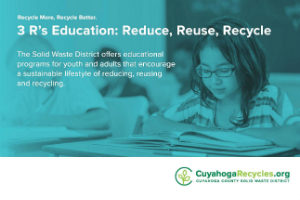
Start a School Recycling Program
For details about starting a recycling program at your school, or assistance with improving an existing program, contact our education specialist at (216) 443-3731 or send an email.
Learn more about our general presentations, compost seminars, and workplace recycling presentations.
